Peter MALONE
Saturday, 18 September 2021 20:01
Yellow Sea
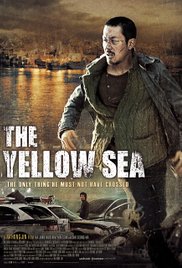
THE YELLOW SEA (HWANGHAE)
Korea, 2010, 140 minutes, Colour.
Ha Jung-woo, Byung hoon Lee.
Directed by Hong-jin na.
Director Hong-jin Na has written and directed only two films, The Chaser and The Yellow Sea. The films belong to the action school of Korean film-making popular since the 1990s. Films like Old Boy and Sympathy for Lady Vengeance made this genre of police and gangster thrillers popular and critically respectable. The Chaser screened at the Cannes Film Festival.
The films are complex in their presentation of characters, the law and the exercise of violence.
This film opens in the seemingly remote area between Korea, China and Russia, home for many migrants after the Korean war, the Cho-Sun-Jok?. The inhabitants are not highly regarded, especially in Seoul where most of the action takes place. There is a lot of crime, gangs and bosses, killers for hire. They can be employed by seemingly respectable criminals in South Korea to handle their dirty work.
While this makes for interesting plots, though there is always a problem of who is working for whom, there is a grim perspective on life, often life being cheap, and difficult to find redeeming characteristics in the gallery of characters. The central character here is a cab driver in Yanji City whose wife has left for Korea and disappeared. He is an inveterate gambler and is hired to go to Seoul to assassinate a professor. This leads to tangles with underworld characters and, in something like the style of Charles Bronson action films of decades ago, this unlikely looking killer uses his wits to survive the increasing attempts on his life.
The film is quite long and becomes repetitive in its confrontations. But, what makes it difficult for some audiences, is the visual and action brutality in the assaults and killings, the close-up gashing (this is a film of blades not guns) and an atmosphere of crime, greed and betrayal that is not for the squeamish.
1. A film from Korea? The work of the director? His interest in crime? Crime worlds?
2. The Chinese setting, the title? The city of Yanj? The settling of this city and this region of China by refugees from Korea at the time of the Japanese occupation? The descendants? Koreans in China?
3. The visuals of the city, the world of the taxi driver, the streets, people, dark areas, gambling halls? The musical score?
4. The Koreans working in China, working, gambling, being fired… In difficulties?
5. Gu-nam, his character, driving the taxi, his presence in China, his relationship with his wife, her going to Korea to work, to send back money, his gambling, his debts, the creditors? His work, customers? Being fired? The approach of the gangster, the task, the commission? To go to Korea? The murder, time to look for his wife – and his suspicions and her not sending back money?
6. The picture of the gangsters, their controls? The various gangs, the plans for the murders, the complexities, going to Korea to supervise and intervene?
7. Gu-nam, his travel to Korea, the train, the boat with the illegal migrants?
8. In Korea, the city, his target, the intervention of the gangsters, his having to go into the building, the plan going awry?
9. His search for his wife? The experience of the contract for the killing? His future?
Published in Movie Reviews
Published in
Movie Reviews
Tagged under
Saturday, 18 September 2021 20:01
Restless/ 2011
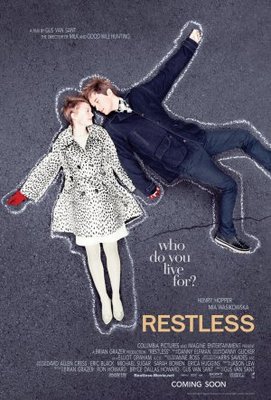
RESTLESS
US, 2011, 91 minutes, Colour,
Mia Wasikowska, Henry Hopper, Ryo Kase, Schuyler Fisk, Jane Adams.
Directed by Gus Van Sant.
A story of love and grief, of illness and death.
The protagonists are a young man and a young woman who might be described as free spirits. He lives with his aunt after his parents’ death. She cares for him, but he is absorbed in his own preoccupations. One of these is attending funerals of people that he doesn’t know. Sometimes he is accepted. Sometimes he is invited to get out. She notices him at a funeral and decides to follow suit. They have a lot in common and an attachment grows that leads to love and a sexual relationship. The difficulty is that she is terminally ill. Nevertheless, Van Sant (whose films are sometimes accessible, Good Will Hunting, Finding Forester, Milk, sometimes a little rarefied, Gerry, Paranoid Park, Last Days) really tells a short story here that younger audiences will identify with, older audiences finding it a little twee.
There is more.
The young man has a lively imagination and has created a ghostly friend, a Japanese kamikaze pilot, who appears and disappears and who serves as a companion and challenging alter ego. He has many reflections on death and choices which sometimes help, sometimes confuse the young man in his relationship with his sick friend.
The stars are Mia Wasikowska (Alice in Wonderland, Jane Eyre, Albert Nobbs) and Henry Hopper, the son of Dennis Hopper. The film is quite short, more like a short story. A light addition to Van Sant’s film list.
1. A film of young adults? The portrait of the two in themselves, their relationship, prospects of death? The work of Gus van Sant?
2. Real/surreal, in plot, characters, their behaviour, attitudes? The presence of the ghost of the kamikaze pilot? Visually real/surreal? The musical score?
3. The funeral, the meeting, sharing, the love, wanting to help? Facing death? The irony of their attending funerals?
4. Annabel, her age, experience, terminal cancer, her life so far, love of nature, interest in Charles Darwin? The prospects for her final months?
5. Enoch, his age, experience, the death of his parents, coma, his opting out of life, the presence of the Japanese ghost?
6. Enoch, forming a bond with Annabel, his wanting to help, the restlessness of the two, tempting fate? Annabel and wanting to live, defying death?
7. The effect on each of them, the pressure of life, pain and anger, yet playfulness?
8. Two misfits, the experience of self-assertion? But having to face reality, death?
9. How real was the ghost, the Japanese kamikaze pilot, as a ghost or reincarnated? His presence, Enoch sharing with him? Enoch and his openness to another world?
10. Annabel, her sister Elizabeth, and anchoring in reality, her advice to Annabel, her warnings?
11. The overall effect for younger audiences, for older audiences and the memories?
Published in Movie Reviews
Published in
Movie Reviews
Tagged under
Saturday, 18 September 2021 20:01
Puss in Boots
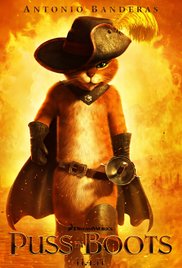
PUSS IN BOOTS
US, 2011, 90 minutes, Colour.
Voices of Antonio Banderas, Salma Hayek, Zach Galifianakis, Billy Bog Thornton, Amy Sedaris, Constance Marie, Guillermo del Toro.
Directed by Chris Miller
As we all know (and liked), Puss in Boots tended to steal scenes from Shrek, Donkey and the rest. So, why not give him his own movie? Of course. And, here it is.
With Antonio Banderas bringing a certain blend of smoulder and bragadaccio to the voice of Puss and the animators giving him plenty of adventures, this has been a surefire box-office attraction. And, most audiences will enjoy it.
It is not bad but does not stay in the memory. It draws on the Zorro stories and has Puss as a blend of outlaw and do-gooder and something of a ladies’ Tom.
The plot also draws on a number of other fairy tale characters who perhaps were upset that they did not make it into the Shrek movies. There is Mother Goose, not as amiable as she should be with her golden eggs. Humpty Dumpty is a shadily ambiguous character. Little Boy Blue is very blue.
But, to challenge Puss and charm him is a masked swordsperson, Kitty Softpaws who, when she takes off the mask, is a chat fatale. And voiced by Salma Hayek, so the full Hispanic accent and purring. They fight. They romance. And, often best of all, they have dancing rivalry that the animators give full burst to.
The film keeps moving, action, comedy, romance (and quite a few double entendres) enough to keep us attentive to the adventures of what one European paper called, ‘Cat in Boots’.
1. An entertaining animation film? 3D? The character of Puss in Boots? His presence in the Shrek films? Having a film of his own?
2. The style of the animation, the drawing of the characters, effects, action? The locations, the fairytale world – and the Hispanic touch? The importance of the voice cast, the talent? Antonio Banderas as Puss?
3. The fairytale world, the characters from the fairy tales – and the twists in their characters and behaviours?
4. Puss, Zorro-like, appearance, swordsmanship? His past, the robbery, the influence of Humpty Alexander Dumpt? His fleeing? His honour and reputation? The past with Humpty Dumpty at the orphanage?
5. Kitty Softpaws, her skills, confronting Puss, listening to his story, joining with him?
6. The role of Mother Goose, the gosling, the eggs, the search and stealing? The Greater Terror protecting the golden eggs?
7. The presence of Jack and Jill, the magic beans?
8. The revelation of the trick, the collaboration of Jack and Jill, Humpty Dumpty, Kitty? Humpty becoming a hero by donating the golden eggs? Puss in prison? Talking with his mother, Imelda, and The Greater Terror and Mother Goose wanting to get back her gosling?
9. The warning from Jack, from Jack and the Beanstalk?
10. The final escapade, Jack and Jill and the betrayals, Puss trying to save the eggs and Humpty Dumpty? Humpty Dumpty sacrificing himself, smashing but revealed as a golden egg?
11. Puss, becoming the hero of the town?
12. The Postscript, Jack and Jill and their wounds, Humpty Dumpty in the gold suit? Puss and his future? Kitty?
Published in Movie Reviews
Published in
Movie Reviews
Tagged under
Saturday, 18 September 2021 20:01
Loving Miss Hatto

LOVING MISS HATTO
UK, 2012, 90 minutes, Colour.
Alfred Molina, Francesca Annis, Rory Kinnear, Maimie Mc Coy, Phoebe Nicholls, Tony Turner, Sarah Woodward, Eve Matheson, Ned Dennehy.
Directed by Aisling Walsh.
Loving Miss Hatto is based on a true story, a story of music and a story of fraud.
The film opens with a funeral and a tribute by her husband to his wife, Joyce, a musician, pianist with a solid reputation. But he indicates that a full story is still to be told.
The first part of the film takes place in 1953, introducing Joyce (Mamie Mc Coy) as a fine pianist and introducing Barrie (Rory Kinnear) who works in a music firm, lost in admiration for her, promising her career and their eventual marriage – to the complete disapproval of her mother, a prim Phoebe Nicholls. While Barrie does make something of a career for his wife, her playing in music groups around the country, he is involved in some tax evasion and spends some time in jail. Joyce also suffers a miscarriage. When he gets her a performance at Festival Hall, she is initially successful but then has nerves and falters.
The second part of the film takes place 50 years later, with Joyce, Francesca Annis, and Barrie, Alfred Molina, living in a country town, he with a small company producing CDs including his wife’s performances – the BBC are interested, sales online increase, there is to be an article about her in the music magazine, Gramophone. The revelation is that Barrie has manufactured the CDs by finding performances of works similar to the way in which his wife played, digitally altering them and releasing them.
At first, Joyce is appalled, but with terminal cancer, she decides to enjoy herself, giving interviews and participating in the fraud. In the credits, there is information that Barrie continually denied that his wife knew anything about the fraud.
Interesting and entertaining, directed by Aisling Walsh, who directed the films about sexual abuse, Sinners and Song for a Raggy Boy as well as many television series.
1. An entertaining story? Musical story? Story of fraud? Based on actual characters and events?
2. The first half of the film, the 1953 settings, costumes and decor and atmosphere, homes, recitals? The second half of the film, out of London, homes, streets, town centres? The realism?
3. The importance of music, the musical score, the pieces played, performance, the digital era, editing the sound, possibilities for fraud?
4. The opening with the funeral, Barry, the people at the church, the tribute to Joyce, her music, his saying that the truth could be told?
5. 1953, Joyce, age, experience, her dominating and critical mother, not encouraging her, putting her down? The sympathetic but quiet father? Her skill at playing the piano? Seeing her at the rehearsal, her skill, the music teacher? Barrie, hearing her, impressed? His talking to her, his enthusiasm, promises?
6. Barrie, his age, character, music publishing, menial job, at the recital, dropping the music, applauding Joyce, the drink, his promises to her, her believing him, his exaggerating, her going to the office and finding the truth? Her mother’s criticism?
7. The swiftness of their marriage, the taking of the photo, the mother and her fussing? Joyce and her pregnancy, the experience of a miscarriage and its effect?
8. Barrie, his enthusiasm, setting up a company, the office, Hong Kong and the importations? Joyce and her playing, in music clubs around the country, the applause? The production of records, Dangerous Moonlight and other film scores? Her teaching? The two young girls and their coming, Chopsticks, her enthusing them, the seats at the performance?
9. Barrie, the police arriving, the tax returns, going to prison, Joyce visiting him, disillusionment, his coming out of jail? The plan for Festival Hall? Getting ready, the dress, nerves, her performance, the first piece and applause, the second piece and her inability to play? The aftermath outside? Saying that both of them perhaps did have not did not have the required iner strength?
10. The transition to the 21st century? The couple married for half a century? This suburban lives? Joyce and her cancer? Her moodiness? Criticising Barrie – and becoming something like her mother? Barrie and his company, producing the CDs? The visit from the former student, looking for Joyce’s CD, welcomed in, reminiscences?
11. The interest in the playing, the range of CDs, the BBC critic, the planning of the article for Gramophone? The revelation of what Barrie was doing, finding the pianist closest to Joyce’s style, digitally altering the playing, the new CD, online sales? The bloggers and
the response to the sales? The Internet, email?
12. The visit of the adult women who were the two young girls? Memories? Barrie’s explanation?
13. The BBC interviewer, his visits, his questions, his belief – yet the discussions with other critics, from America, his editor? Seeking to verify the truth? The phone calls, his visits, the interviews? Joyce and her going along with the fraud?
14. Joyce’s initial reaction, dishonesty, Barry and his persuasiveness, her agreeing? Their working on a range of performances? Success – but suspicions?
15. Philip and his final visit, Joyce’s collapse, her death? Interrogations of Barrie? The funeral, his alleged willingness to tell the truth? Saying that he perpetrated the fraud – and maintaining that Joyce knew nothing?
16. The aftermath information – and Barrie remaining true to Joyce?
Published in Movie Reviews
Published in
Movie Reviews
Tagged under
Saturday, 18 September 2021 20:01
Asterix: Le Domaine de Dieu
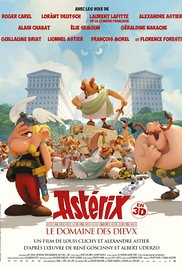
ASTERIX: LE DOMAINE DES DIEUX/ ASTERIX AND OBELIX: MANSION OF THE GODS
France, 2014, 85 minutes, Colour.
Voices of: Roger Carel, Alexandre Astier, Alain Chabat.
Directed by Louis Clichy, Alexandre Astier.
This is another amusing animated version of the celebrated comics by Ren Goschiny and Albert Uderzo. The adventures of Asterix and his fellow Gauls have been portrayed in animated films periodically since the 1960s. There have also been some live-action versions of the stories, notable for featuring Gerard Depardieu her as Obelix, made to look very much like the comic strip character.
This animation film was made in 3 D.
This time there is a more straightforward story. In Rome, Caesar is consulting his advisers and upset that one small area of Brittany would not submit to the Roman Empire. Gets the brainwave of setting up a Roman colony adjacent to the Gauls village. There is even a competition and a Roman family gets the prize and an apartment in the village – though they have to keep supplying documentation and are soon turfed out.
What are Asterix and Obelix and the other Gauls to do. While they are at war with Rome and there are clashes, there is some accommodation with Caesar in the setting up of the village. Nevertheless, the Gauls use their wiles to deceive the Romans and upset Caesar and the village, even appearing in the amphitheatre and offering entertainment with bird sounds.
There are many of the familiar features, especially a potion that gives giant strength to those worlds albeit; there is a range of slaves, especially black slaves and some comedy about an general trying to dispose of a tree which Obelix always picks up and replaces; and, the Gauls have an ability not only to replace a tree but to multiply trees even to a forest, to the continued exasperation of the Romans.
Asterix and his friends want to keep the environment as well is put the Romans at Bay – and habitability to knock down multi-storey buildings almost as soon as the Romans built them up.
And, as always, there are very funny names, which are enjoyably rendered into English funny names – and there is always the dog, Dogmatix.
There is also some final play on Caesar and his famous quote about coming in conquering, Veni, Vidi, Vici.
Published in Movie Reviews
Published in
Movie Reviews
Tagged under
Saturday, 18 September 2021 20:01
C Word, The
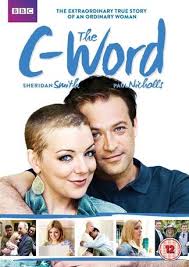
THE C- WORD
UK, 2015, 90 minutes, Colour.
Sheridan Smith, Paul Nicholls, Michael Maloney, Haydn Gwynne.
Directed by Tim Kirkby.
The C Word is based on a book and a blog by Lisa Lynch. It is a true story.
Sheridan Smith appears as Lisa Lynch, a woman in her late 20s, recently married, working, but diagnosed with breast cancer. The film traces the diagnosis, her work with the doctor, surgery, chemotherapy, recovery from chemotherapy, a period of calm before the cancer recurs.
In order to cope with her experiences, she starts a blog, finds that she is a good writer, also finds that writing is a wonderful outlet to help her cope with her cancer experiences – and that many readers find her blog very helpful, especially women suffering from breast cancer, sharing their experiences with her.
The film shows very directly the effects of chemotherapy, breast surgery and new construction, hair falling out, wigs… She is very well supported by her devoted husband, Paul Nicholls. Her father is a quiet man and is also supportive, a touch of the stoic, while her mother is immediately highly emotionally affected but is also a support.
Sheridan Smith is effective in the central role, making Lisa Lynch credible in all these aspects of her life, and in her illness and the time leading up to her death.
The screenplay makes the point that her book, The C Word, was of enormous help not only to the women suffering from cancer but also for their carers.
1. The title? Cancer? Responses to diagnosis of cancer, by the patient, by spammers, by family, by friends? The role of doctors, surgeons, nurses, anaesthetist, counsellors?
2. The film based on the book and blog by Lisa Lynch? A bestseller and strong influence, especially for women, women with breast cancer, carers, family, therapists?
3. The British setting, families and homes, workplaces, hospitals, therapists?
4. The importance of the blog, Lisa starting it, her skill in writing, as a therapy for her thoughts and feelings, its being read by many people, by her parents, responders to the blog, people make themselves known?
5. Audience response to Lisa experience, of illness, diagnosis, chemotherapy, after maths, the recurring of the disease, final coping? Audiences identifying with her?
6. Sheridan Smith as Lisa? Age, personality, the love for Peter, their life together, the video of the wedding ceremony? To the Dr, the diagnosis, her response, calm? Her reaction to her parents and their concern? Her wanting to be ready for her brother’s wedding? The information about chemotherapy, the progress and the doses, the reaction, losing her hair, checking on the weeks, going to the shop, the diarrhoea and the physical effect, her moods, the effect of writing the blog?
7. Peter, his character, love to his wife, his work, some time off, his continued accompaniment? Reaction to the men at work? His comment about always boiling the kettle? With Lisa’s parents? With blog fans? Meetings in restaurants, photos? The final diagnosis, is asking for time off, and his accompanying Lisa to the wedding and their enjoyment of it? The strong character, commitment and love?
8. The glimpse of the parents, their concern about Lisa, the visits, the father calm, the mother and her being upset, the support of the brother? The parents in their continued visits, working, being present? The wedding and its enjoyment?
9. Lisa, her friends, the discussions about the cancer, the friend who was frank in talking about it?
10. The Dr, always sympathetic, sound advice, encouragement, the x-rays and the cancer under control, its return? The staff at the hospital and their support? The visit to the therapist, sympathetic, her recommending the book, her reaction on discovering Lisa had written it? Lisa’s further visits and being able to talk to the therapist?
11. The recurrence, the treatment, the effect on Lisa, her listlessness, listening to her advisers, with Peter, her parents? The blog? Finding the moment of trans formation? The moments of peace and the outing with Peter and the Sun? Her gradual decline?
12. The death of her friend from the blog, meeting with the other women, the toasts, the talk, the support?
13. The final information about her death and its sadness?
Published in Movie Reviews
Published in
Movie Reviews
Tagged under
Saturday, 18 September 2021 20:01
Legacy/ 2013
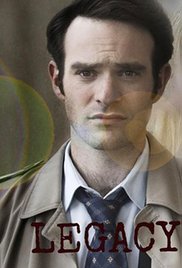
LEGACY
UK, 2013, 90 minutes, Colour.
Charlie Cox, Andrew Scott, Romola Garai, Olivia Grant, Tessa Peake -Jones, Geraldine James, Christian Mc Kay, Simon Russell Beale, Richard Mc Cabe.
Directed by Pete Travis.
Legacy is based on a novel by Alan Judd. The film has been directed by Peter Travis who has directed a range of films including the retrospective on the events in 1998 in Omagh, the thriller Vantage Point, the Judge Dredd film, as well as the television version of The Go- Between.
The setting is 1960s with Charles, Charlie Cox, starting work at the foreign office, given a contact with a KGB officer with whom he studied at the University, Andrew Scott. There are further complications with a prostitute connection, with the various officials at the office, including an interesting performance by stage actor Simon Russell Beale, with Geraldine James as a knowledgeable expert. There is also intimations of a marital tangle with Romola Garai.
The film is set in the dark London, investigations into the KGB and counter-espionage, and the plot by Russian spies to plant boxes all over the country with plans for industrial sabotage.
1. A Cold War Story? The atmosphere of the 1960s? The UK and espionage? Russian spies, the KGB?
2. The London settings, the city, the club, apartments, homes, dark streets and underpasses, the river, foreign office? The musical score?
3. The title, Charles and his father, his legacy, the ambiguities, the final vindication? The name of the Soviet plan? The threat to British security?
4. Charles, his background education, friendship with Victor, Foreign Office, the officials and his tasks? The encounter with the prostitute, the discussions, her refusal, the money, the information about Victor? Charles returning to her, the information about the golf course? Her murder? His phoning it in? The chief and his sending workers to clean up the situation?
5. Victor, past friendship with Charles, studies together, KGB? Charles tracking him down? The discussion by the river, the information about Charles’s father, the compensation money? Further meetings with Victor? Giving the information to the foreign office officials?
6. Charles, going to see his mother, the death of his father, her grief, cleaning out the office, finding the photo, asking his mother about his father’s trips, the suggestion that he was a spy, his mother’s reaction?
7. The officials, the discussions, Hookey, in charge, his manner, the meal and discussions with Charles? Hugo, his relationship with his wife, his affairs? The meal and the blackout? Martha, her knowledge and expertise, identifying the photo and the individual?
8. Charles, following Victor, at the golf course, digging, finding the box, the information? Hookey and his further explanations, stating that Charles’s father was a double agent, his reputation vindicated? And the officials using Charles to get the information about Legacy? Charles, with Victor, examining the second box, the pursuer on the bicycle – Charles chasing, shooting him? The explosives in the box, stopping the detonation?
9. Charles and his personal life, the visits to Anna, her relationship with her husband, his infidelities? Her children?
10. An interesting film about the Cold War and counter espionage by the UK?
Published in Movie Reviews
Published in
Movie Reviews
Tagged under
Saturday, 18 September 2021 20:01
Project Nim
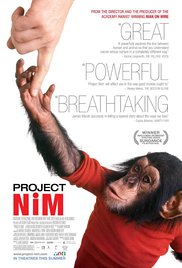
PROJECT NIM
UK, 2011, 93 minutes, Colour.
Directed by James Marsh.
James Marsh made the fascinating and Oscar-winning documentary on tightrope walker, Phillippe Petit, Man on Wire. He has now made another fascinating documentary but not in the way we might have imagined. It is the story of chimpanzee, Nim Chimpsky, who was the subject of an experiment during the 1970s. Taken from an Oklahoma centre, Nim was fostered by a family, who were not expert on care of monkeys. He was then taken away to Texas by himself where he bonded with a worker. But, then he was taken to Lemsip, an institute for animal use in testing drugs.
While Nim seemed to respond to sign language and indicated some kind of communication, Herbert Terrace, the initiator of the experiment, changed his mind about its success and terminated the program. But, instinctively, Nim does some violence and damage to carers.
But, what is of great interest along with the issue of cruelty to animals and experimentation with them, is how the humans behaved. While a couple of characters are presented by actors, most of the principals are seen in the movies made at the time and, seated individually, being interviewed in the present. There was a clash of personalities, some highhanded and authoritarian interventions, a lack of communication abilities and sensitivities, which means the film is also a study of human behaviour.
The present interviews juxtaposed with the past movie footage also remind us of how age and ageing is inevitable and irrevocable.
The story of Nim is presented chronologically and we can sympathise with the chimpanzee, first of all being treated like a spoiled child, as someone remarks. Then, without warning, sudden change, isolation like imprisonment. Then some care. Then experimentation. Then old age.
The human story goes back and forth giving some of them the opportunity to reassess their behaviour (especially the director of Lemsip), while others are tearful about the past, rueful, regretful – and sometimes condemnatory.
There are moral issues in the film: the right of the experimenter to toy with animals in this way, and for such a long time, and with people participating who were not qualified; and there is the question of animals, no matter how close their structure is to humans, actually having intelligence and whether the sign language recognition is from mimicry. Noam Chomsky advocates humans as the only intelligent specis – and the name Nim Chimpski was derived from Chomsky.
(A film for comparison is the French story of a gorilla in a zoo, Nenette, and care and zoo visitors.)
Published in Movie Reviews
Published in
Movie Reviews
Tagged under
Saturday, 18 September 2021 20:01
Jackpot, The/ 1950
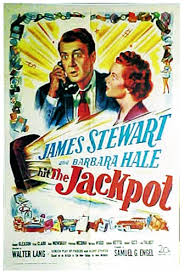
THE JACKPOT
US, 1950, 85 minutes, Black and white.
James Stewart, Barbara Hale, James Gleason, Fred Clark, Alan Mowbray, Patricia Medina, Natalie Wood, Tommy Rettig, Lyle Talbot.
Directed by Walter Lang.
Jackpot is a popular American comedy from the late 40s, early 1950s, a pleasant star vehicle for James Stewart is an ordinary American middle American husband, father, work in a store. It reflects the situation of post-war USA, aspects of the economy, making ends meet, jobs – and the dream of winning prizes.
However, the dream is short lived as the taxman turns up demanding $7000 in tax and our hero is forced to sell a lot of the prizes, trying in the stall but then fired by his boss, attempting to get rid of the diamond ring with shady characters in Chicago and being arrested. Barbara Hale, to be Perry Masons Della Street, plays the wife and young Natalie Wood and the young Tommy Rettig are the two children. Patricia Medina plays an artist, who is part of the prize, but the wife become suspicious of the artist. James Gleason is a friendly journalist who helps out our hero; Fred Clark is the boss; Alan Mao brain is the interior decorator who is also part of the prize.
Water Lane West and adapt direct many musicals at 20th Century Fox, including The King and I. The screenplay was written by award-winning Henry and Phoebe Ephron.
1. A popular 1950s comedy? Post-war? The American economy, family life, workplace? Seeing now in retrospect? New
2. black-and-white photography, the musical score, Harry James on radio, the strong cast?
3. James Stewart, his screen presence, as Bill, his age, background, Midwestern, at the store, his boss, relationship with his wife, the two children, managing?
4. The quiz, the radio, winning the prize, the Jackpot? The range of prizes: $24,000 worth? A side of beef, 7500 cans of soup, 1000 fruit trees, Palomino pony, portable swimming pool, diamond ring, French maid, interior decorator and portrait painter.
5. The tax authorities, billing debt, the repercussions for his wife and children? The details of family life?
6. Trying to sell goods are stored, the reaction of his boss, being fired? The comedy of his trying to fence the ring in Chicago, the arrest?
7. The domestic situation, Bill’s wife, suspicions of Hilder, her place in the household, artist?
8. The French with Harry, journalist, writing the articles, influential in helping Bill?
9. The happy resolution?
Published in Movie Reviews
Published in
Movie Reviews
Tagged under
Saturday, 18 September 2021 20:01
Inkeepers, The

THE INNKEEPERS
US, 2011, 101 minutes, Colour.
Sara Paxton, Pat Healey, Kelly Mc Gillis.
Directed by Ti West.
An old hotel in the 19th century style. About to close. A few strange guests. Two staff members who are investigating the alleged haunting of the hotel.
This is a ghost story which operates on the slow burn principle and techniques, building up atmosphere, popping in a few scares for us to jump, and an ending and explanation (or lack of) that is a bit of a flame flickering and being extinguished.
Sara Paxton and Pat Healey are Claire and Luke, caretaking the hotel and experimenting with discovering who the ghost is – and taping mysterious sounds and piano notes. How serious they are is hard to tell, especially when Claire has a session with an ageing actress (a welcome Kelly Mc Gillis) who has discovered she has healing and psychic powers. Claire may not be taking her too seriously.
She should have. An old man comes to the hotel for the final night, wanting a room that he stayed in for his honeymoon, long ago. He looks more than old, really ancient. And something dreadful happens in his room. Sara becomes more alarmed, a touch hysterical and goes down (why??) into the dark basement. She sees things. She sees people. But, is this real, are there ghosts, or is it all happening in Sara’s imagination?
Quite a lot of things going for The Innkeepers, but it relies more on its atmosphere than jolts and shocks.
1. A slow-burning ghost story, horror film? The director and his reputation?
2. The location, the Yankee Pedlar Inn (and filming in the actual Inn), the outside, the setting, the interiors, the ordinary rooms, the basement, the rooms and their being stripped for the closing down? The musical score?
3. Claire and Luke, the final weekend of business, Claire and her asthma, her personality, dropping out of studies? Luke, his working on the website, interested in hauntings?
4. The theme of ghosts, hunting ghosts, the hauntings, the history of the apparitions in the Inn? Madeleine, the bride hanging, the body in the basement? Her appearances?
5. Leanne, arriving, her past as an actress, going to a convention, the initial clash with Claire?
6. The noises from the garage, the episode, Claire and her locking the door, the recording equipment, picking up sounds, the piano mysteriously playing by itself?
7. The psychics’ convention, Leanne and her warnings, Claire and the apparition?
8. The visitor, getting the room, wanting the third floor, unavailable, the bed ready, putting out fresh sheets for him?
9. The investigations, and Luke’s searching?
10. Luke and Claire, the ghost, finding the man had committed suicide, Madeleine hanging again, the man later appearing as a ghost?
11. Claire, being trapped, her having locked the door, unable to get out? Leanne and warnings? Claire and her dying from an asthma attack?
12. And Leanne leaving – and the glimpses of Claire at the window as an apparition?
Published in Movie Reviews
Published in
Movie Reviews
Tagged under